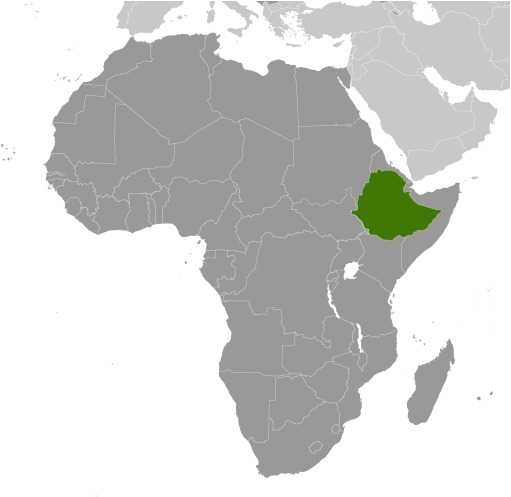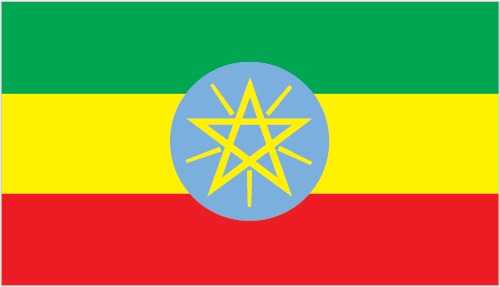Introduction
Background
Unique among African countries, the ancient Ethiopian monarchy maintained its freedom from colonial rule with the exception of a short-lived Italian occupation from 1936-41. In recent years, Ethiopia has experienced periods of ethnic-based violence.
Geography
Area
total: 1,104,300 sq km
land: 1,096,570 sq km
water: 7,730 sq km
Climate
tropical monsoon with wide topographic-induced variation
Natural resources
small reserves of gold, platinum, copper, potash, natural gas, hydropower
People and Society
Population
total: 118,550,298
male: 59,062,093
female: 59,488,205 (2024 est.)
Ethnic groups
Oromo 35.8%, Amhara 24.1%, Somali 7.2%, Tigray 5.7%, Sidama 4.1%, Guragie 2.6%, Welaita 2.3%, Afar 2.2%, Silte 1.3%, Kefficho 1.2%, other 13.5% (2022 est.)
Languages
Oromo (official working language of Oromia Regional State) 33.8%, Amharic (official national language) 29.3%, Somali (official working language of Somali Regional State) 6.2%, Tigrigna (Tigrinya) (official working language of Tigray Regional State) 5.9%, Sidamo 4%, Wolaytta 2.2%, Gurage 2%, Afar (official working language of Afar Regional State) 1.7%, Hadiyya 1.7%, Gamo 1.5%, Gedeo 1.3%, Opuuo 1.2%, Kafa 1.1%, other 8.1%, English
note: Sidama is an official working language of Sidama Regional State (2007 est.)
Religions
Ethiopian Orthodox 43.8%, Muslim 31.3%, Protestant 22.8%, Catholic 0.7%, traditional 0.6%, other 0.8% (2016 est.)
Population growth rate
2.37% (2024 est.)
Government
Government type
federal parliamentary republic
Capital
name: Addis Ababa
Executive branch
chief of state: President SAHLE-WORK Zewde (since 25 October 2018)
head of government: Prime Minister ABIY Ahmed Ali (since April 2018); Deputy Prime Minister TEMESGEN Tiruneh Dinku (since 8 February 2024)
Legislative branch
description: bicameral Parliament consists of:
House of Federation or Yefedereshein Mikir Bete (153 seats maximum; 144 seats current; members indirectly elected by state assemblies to serve 5-year terms)
House of People's Representatives or Yehizb Tewokayoch Mekir Bete (547 seats maximum; 470 seats current; members directly elected in single-seat constituencies by simple majority vote; 22 seats reserved for minorities; all members serve 5-year terms)
Economy
Economic overview
growing Horn of Africa construction- and services-based economy; port access via Djibouti and Eritrea; widespread but declining poverty; COVID-19, locust invasion, and Tigray crisis disruptions; public investment increases; second largest African labor force
Real GDP (purchasing power parity)
$293.788 billion (2022 est.)
$278.956 billion (2021 est.)
$264.059 billion (2020 est.)
Real GDP per capita
$2,400 (2022 est.)
$2,300 (2021 est.)
$2,300 (2020 est.)
Agricultural products
maize, wheat, cereals, sorghum, milk, barley, taro, potatoes, millet, beans (2022)
Industries
food processing, beverages, textiles, leather, garments, chemicals, metals processing, cement
Exports
$10.971 billion (2022 est.)
$9.496 billion (2021 est.)
$7.715 billion (2020 est.)
Exports - partners
UAE 17%, US 13%, Germany 6%, Saudi Arabia 6%, Somalia 6% (2022)
Exports - commodities
coffee, gold, garments, cut flowers, vegetables (2022)
Imports
$24.187 billion (2022 est.)
$20.859 billion (2021 est.)
$17.17 billion (2020 est.)
Imports - partners
China 24%, US 9%, India 8%, UAE 6%, UK 4% (2022)
Imports - commodities
wheat, refined petroleum, fertilizers, vaccines, palm oil (2022)
Exchange rates
birr (ETB) per US dollar -
Exchange rates:
51.756 (2022 est.)
43.734 (2021 est.)
34.927 (2020 est.)
29.07 (2019 est.)
27.429 (2018 est.)
Page last updated: Wednesday, May 22, 2024




